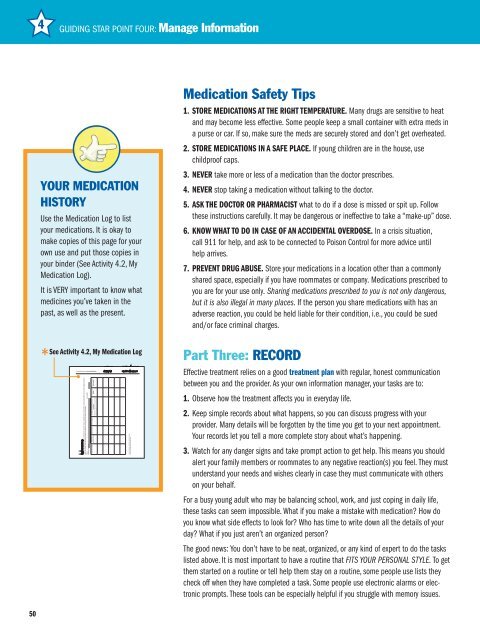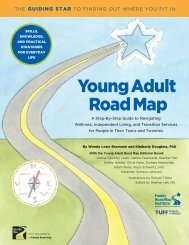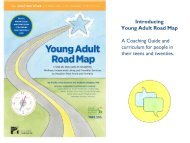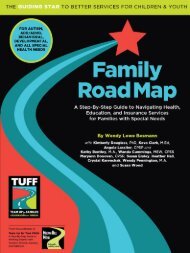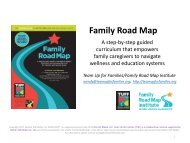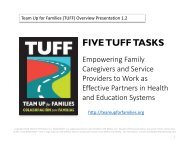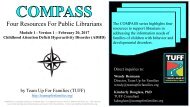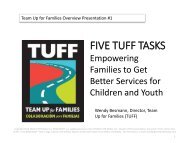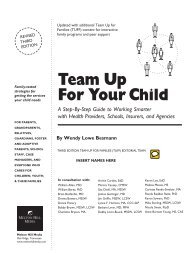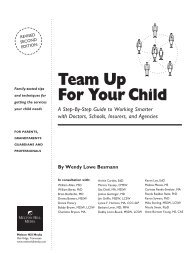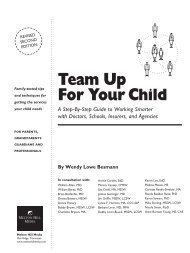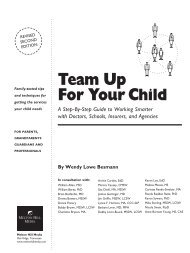Look Inside Young Adult Road Map
You also want an ePaper? Increase the reach of your titles
YUMPU automatically turns print PDFs into web optimized ePapers that Google loves.
Guiding Star Point Four: Manage INFORMATION Activity 4.2 <strong>Young</strong> <strong>Adult</strong> <strong>Road</strong> <strong>Map</strong>, Supplemental<br />
Guiding Star Point Four: Manage INFORMATION Activity 4.2 <strong>Young</strong> <strong>Adult</strong> <strong>Road</strong> <strong>Map</strong>, Supplemental<br />
Activity 4.1<br />
Activity 4.1<br />
<strong>Young</strong> <strong>Adult</strong> <strong>Road</strong> <strong>Map</strong>: A Step-by-Step Guide to Navigating Wellness, Independent Living, and Transition Services<br />
for People in Their Teens and Twenties. Copyright ©Melton Hill Media, LLC, 2018. All rights reserved.<br />
<strong>Young</strong> <strong>Adult</strong> <strong>Road</strong> <strong>Map</strong>: A Step-by-Step Guide to Navigating Wellness, Independent Living, and Transition Services<br />
for People in Their Teens and Twenties. Copyright ©Melton Hill Media, LLC, 2018. All rights reserved.<br />
4<br />
Guiding Star Point four: Manage Information<br />
Medication Safety Tips<br />
1. STORE MEDICATIONS AT THE RIGHT TEMPERATURE. Many drugs are sensitive to heat<br />
and may become less effective. Some people keep a small container with extra meds in<br />
a purse or car. If so, make sure the meds are securely stored and don’t get overheated.<br />
2. STORE MEDICATIONS IN A SAFE PLACE. If young children are in the house, use<br />
childproof caps.<br />
your medication<br />
history<br />
Use the Medication Log to list<br />
your medications. It is okay to<br />
make copies of this page for your<br />
own use and put those copies in<br />
your binder (See Activity 4.2, My<br />
Medication Log).<br />
It is VERY important to know what<br />
medicines you’ve taken in the<br />
past, as well as the present.<br />
*<br />
See Activity 4.2, My Medication Log<br />
My Medication My Medication Log Log<br />
This chart<br />
This<br />
helps<br />
chart<br />
keep<br />
helps<br />
information<br />
keep information<br />
on medicines<br />
on medicines<br />
in one place.<br />
in one<br />
Keep<br />
place.<br />
an updated<br />
Keep an<br />
version<br />
updated<br />
in<br />
version<br />
your binder<br />
in your<br />
to bring<br />
binder<br />
to<br />
to<br />
appointments<br />
bring to appointments<br />
and use when<br />
and use<br />
talking<br />
when<br />
to<br />
talking<br />
doctors<br />
to<br />
by<br />
doctors by<br />
phone. Put<br />
phone.<br />
a copy<br />
Put<br />
inside<br />
a copy<br />
the<br />
inside<br />
medicine<br />
the<br />
cabinet<br />
medicine<br />
or<br />
cabinet<br />
lockbox<br />
or<br />
to<br />
lockbox<br />
use when<br />
to use<br />
you<br />
when<br />
refill weekly<br />
you refill<br />
pill<br />
weekly<br />
containers.<br />
pill containers.<br />
Name:<br />
Name:<br />
Last updated:<br />
Pharmacy<br />
Last updated:<br />
Pharmacy<br />
name/Ph.<br />
name/Ph.<br />
#:<br />
#:<br />
Name of Medication Total Dosage Date Rx started Date Rx stopped Directions: How Much/When/Special Prescription ID Doctor/NP’s Name/<br />
Name of Medication Total Dosage Date Rx started Date Rx stopped Directions: How Much/When/Special Prescription ID Doctor/NP’s Name/<br />
(Example: 40 mg)<br />
instructions<br />
Number<br />
Phone Number<br />
(Example: 40 mg)<br />
instructions<br />
Number<br />
Phone Number<br />
(Example: 20 mg tablet morning, 20 mg<br />
(Example: 20 mg tablet morning, 20 mg<br />
tablet evening/Take with food/Avoid sun)<br />
tablet evening/Take with food/Avoid sun)<br />
Over-the-counter (non- prescription) medicines, vitamins,<br />
and herbs (including<br />
Over-the-counter<br />
amounts<br />
(nonand<br />
when<br />
prescription)<br />
taken):<br />
medicines, vitamins,<br />
and herbs (including amounts and when taken):<br />
3. NEVER take more or less of a medication than the doctor prescribes.<br />
4. NEVER stop taking a medication without talking to the doctor.<br />
5. ASK THE DOCTOR OR PHARMACIST what to do if a dose is missed or spit up. Follow<br />
these instructions carefully. It may be dangerous or ineffective to take a “make-up” dose.<br />
6. KNOW WHAT TO DO IN CASE OF AN ACCIDENTAL OVERDOSE. In a crisis situation,<br />
call 911 for help, and ask to be connected to Poison Control for more advice until<br />
help arrives.<br />
7. PREVENT DRUG ABUSE. Store your medications in a location other than a commonly<br />
shared space, especially if you have roommates or company. Medications prescribed to<br />
you are for your use only. Sharing medications prescribed to you is not only dangerous,<br />
but it is also illegal in many places. If the person you share medications with has an<br />
adverse reaction, you could be held liable for their condition, i.e., you could be sued<br />
and/or face criminal charges.<br />
Part Three: Record<br />
Effective treatment relies on a good treatment plan with regular, honest communication<br />
between you and the provider. As your own information manager, your tasks are to:<br />
1. Observe how the treatment affects you in everyday life.<br />
2. Keep simple records about what happens, so you can discuss progress with your<br />
provider. Many details will be forgotten by the time you get to your next appointment.<br />
Your records let you tell a more complete story about what’s happening.<br />
3. Watch for any danger signs and take prompt action to get help. This means you should<br />
alert your family members or roommates to any negative reaction(s) you feel. They must<br />
understand your needs and wishes clearly in case they must communicate with others<br />
on your behalf.<br />
For a busy young adult who may be balancing school, work, and just coping in daily life,<br />
these tasks can seem impossible. What if you make a mistake with medication? How do<br />
you know what side effects to look for? Who has time to write down all the details of your<br />
day? What if you just aren’t an organized person?<br />
The good news: You don’t have to be neat, organized, or any kind of expert to do the tasks<br />
listed above. It is most important to have a routine that FITS YOUR PERSONAL STYLE. To get<br />
them started on a routine or tell help them stay on a routine, some people use lists they<br />
check off when they have completed a task. Some people use electronic alarms or electronic<br />
prompts. These tools can be especially helpful if you struggle with memory issues.<br />
50


